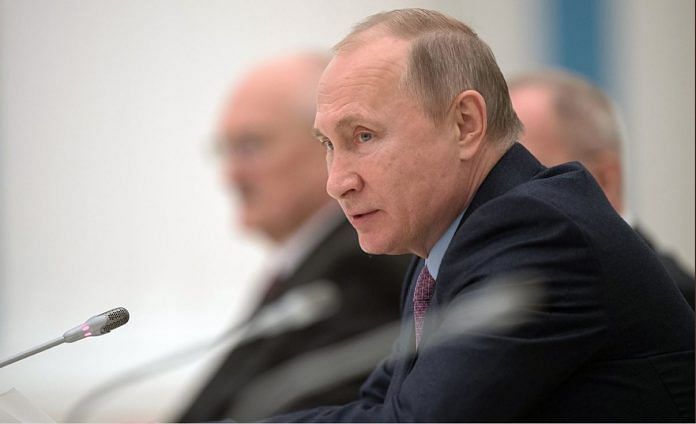In a widely criticized move, Poland’s increasingly authoritarian right-wing government has criminalised the term “death camps”, as well as any suggestion of “the Polish nation/state” being complicit in Nazi crimes. In Asia, Moon Jae-in’s realpolitik in managing the Winter Olympics and North Korea’s extended hand of friendship is commendable. Meanwhile, the Russian election is being recognised as a sham after Putin barred his main opponent, Alexei Navalny, from running in the race.
The death of the “death camp”
“It is baffling why Poland’s nationalist-controlled Parliament would mark International Holocaust Remembrance Day — the anniversary of the liberation of Auschwitz-Birkenau, the largest Nazi concentration camp on Polish soil — with a needless, foolish and insulting draft bill that would penalize any suggestion of complicity by the Polish state or the Polish nation in the Nazi death machine,” editorializes the New York Times.
Poland has now become a right-wing bastion in Europe, and its latest move to criminalise the term “Polish death camps” is controversial. Poland is not the first country to try and change its own history, but it is important not to erase complicity in one of the biggest crimes in history. “These are the facts of that terrible history, and the Poles, like all other nations conquered by Germany that became embroiled in the Nazi atrocities, have an obligation to the victims and to the future to seek the full truth, however painful.”
“Regardless how it is parsed, the Polish bill is a blatant and chilling effort by a nationalist government waging an offensive against the rule of law and freedom of expression to discourage that search. “Whoever accuses, publicly and against the facts, the Polish nation, or the Polish state, of being responsible or complicit in the Nazi crimes committed by the Third German Reich … shall be subject to a fine or a penalty of imprisonment of up to three years,” reads an article of the draft. But what constitutes an accusation? Who determines the facts? Who will risk three years in prison to seek the historical truth?” the Times asks, as does the Washington Post in an angry editorial.
A sham election
The Organization for Security and Cooperation in Europe (OSCE) is going to be keenly observing the Russian election on March 18. In the Washington Post, Vladimir Kara-Murza, writes about how Russia has been consistently failing to meet the standards set by OSCE— and that the country should now be held accountable by the West.
“For years, the attitude of Western democracies toward Russian elections has followed a strikingly duplicitous model: After observers from OSCE countries concluded that the elections had not been free or fair, the leaders of those same countries — democratically elected presidents and prime ministers — called Vladimir Putin to congratulate him, in effect, on a successful theft.”
Kara-Murza writes that the Russian election has already been defined, because Putin has already eliminated genuine competition by debarring Alexei Navalny from taking part in the presidential race.
“This time around, Western leaders should not rush to congratulate the “winner,” awarding the international seal of approval to yet another mockery of the democratic process. The only acceptable form of legitimacy for an OSCE member-state government in the 21st century should be one based on free and fair elections. To affirm this is the least that can be expected from countries that pride themselves on democratic governance and the rule of law,” writes Kara-Murza.
Korea’s political Olympics
Moon Jae-in, the South Korean President, has “both neutralized the threat of North Korean disruption to the Games and kept a thin-skinned US president firmly on his side,” writes Christopher R. Hill in Project Syndicate.
“Moon, for his part, has handled Kim’s “peace offensive” well,” he writes. While the talks are unlikely to be renewed to discuss nuclear disarmament after the Olympics, the gesture of goodwill and joint representation has been widely appreciate by the masses, and will possibly stave off major conflict for some time to come.
“But Moon has made it clear that his government will not be seduced by the Olympic spirit. If North Korea’s leaders expect participation in the Games to lead to recognition of their country’s nuclear status, they will be waiting a long time. The South’s goal is to host a successful Olympic Games, after a year in which many countries questioned whether it was safe to send a delegation at all. Once the Games are over, the North will be facing a long winter of opprobrium and isolation.”
“Like the Saudis and others before him, Moon knows that the way to Trump’s heart is through his ego. But he also must manage the broader front of countries that are participating in historically strong sanctions against an abhorrent state. In that respect, Moon’s first big test will come immediately after the Olympics, when the South Korea-US Combined Forces Command will decide on its plans for future military exercises,” Hill argues.
“At the end of the day, a progressive South Korean government such as Moon’s always must demonstrate to the public that it can manage and safeguard the US relationship. So far, Moon has done that,” he concludes.



